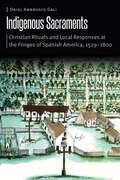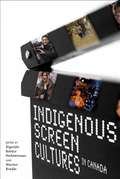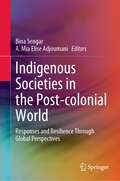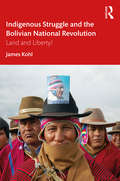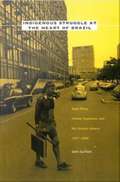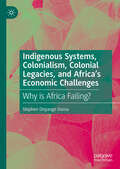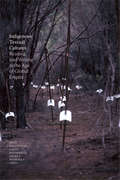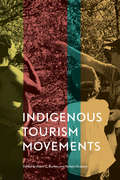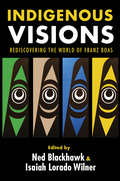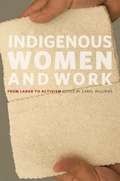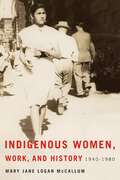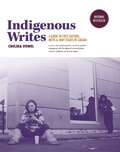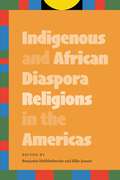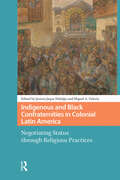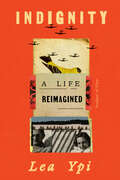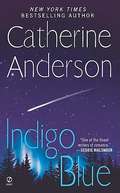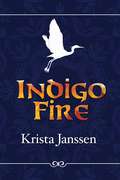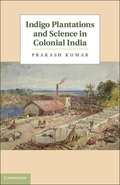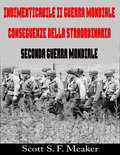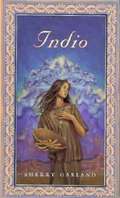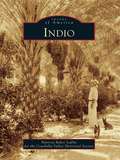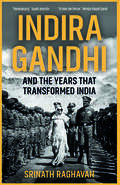- Table View
- List View
Indigenous Sacraments: Christian Rituals and Local Responses at the Fringes of Spanish America, 1529–1800 (Borderlands and Transcultural Studies)
by Oriol Ambrogio GaliIndigenous Sacraments provides the first study of Indigenous perceptions of the Christian sacraments at the fringes of colonial Spanish America, particularly in the missions established by the Jesuits in northwestern Mexico, central southern Chile, and the Gran Chaco. After Jesuit missionaries arrived in these regions between the end of the sixteenth and the early seventeenth centuries, their sacraments came to control every rite of passage, from birth to reaching adulthood to the formation of new families to death. Through the administration of the sacraments, missionaries intended to replace extant Indigenous habits and beliefs with Christian values. The disruptions triggered by such processes raised multiple local reactions, from initial curiosity and incomprehension to rejection, partial acceptance, and ritual imitation. Locals debated the newly introduced rituals and both violently rejected them and developed their own versions, becoming active participants in the sacraments&’ diffusion. Oriol Ambrogio Gali draws on a range of diverse sources to explore the changing attitudes toward the sacraments and to highlight the cultural and religious evolution of the Indigenous groups living at the fringes of Spanish America. By exploring local perceptions of the Christian sacraments, Ambrogio Gali shows that Indigenous peoples were far from static recipients of Christianity in the Americas.
Indigenous Screen Cultures in Canada
by Sigurjón Baldur Hafsteinsson Marian BredinIndigenous media challenges the power of the state, erodes communication monopolies, and illuminates government threats to indigenous cultural, social, economic, and political sovereignty. Its effectiveness in these areas, however, is hampered by government control of broadcast frequencies, licensing, and legal limitations over content and ownership.Indigenous Screen Cultures in Canada explores key questions surrounding the power and suppression of indigenous narrative and representation in contemporary indigenous media. Focussing primarily on the Aboriginal Peoples Television Network, the authors also examine indigenous language broadcasting in radio, television, and film; Aboriginal journalism practices; audience creation within and beyond indigenous communities; the roles of program scheduling and content acquisition policies in the decolonization process; the roles of digital video technologies and co-production agreements in indigenous filmmaking; and the emergence of Aboriginal cyber-communities.
Indigenous Societies in the Post-colonial World: Responses and Resilience Through Global Perspectives
by Bina Sengar A. Mia Elise AdjoumaniThis edited book provides perceptions on “indigeneity” through a global perspective. Emphasizing the contemporary and postcolonial debates on indigenous, it delves into diversity and dissonance within indigenous concepts. Through its chapters based on theoretical and empirical studies from Asian, African, and American perceptions of indigenous societies, it brings out complexity, resilience, and response of “indigenous” in the post-colonial global society. It especially looks at how these societies manage to move forward by going beyond the stigma of the colonial past. The chapters in the book are divided into three sections where they discuss indigenous cultures through interdisciplinary perspectives. The narrative approach of historical concepts and contemporary indigenous challenges within the book include anthropological, cultural, ecological, historical, literary, and legal studies. The contributions in the collection come from widely respected international scholars who are engaged in indigeneity and postcolonial questions. It allows the reader to (re)discover the theories and resilience of the indigenous societies that are historically marked and are reshaping the histories and contemporary narratives in the world. This book is of particular interest to scholars, students, policymakers, and people curious about the histories and the dynamic progress of the indigenous and indigenous societies of Africa, the Americas, and Asia.
Indigenous Struggle and the Bolivian National Revolution: Land and Liberty!
by James KohlIndigenous Struggle and the Bolivian National Revolution: Land and Liberty! reinterprets the genesis and contours of the Bolivian National Revolution from an indigenous perspective. In a critical revision of conventional works, the author reappraises and reconfigures the tortuous history of insurrection and revolution, counterrevolution and resurrection, and overthrow and aftermath in Bolivia. Underlying the history of creole conflict between dictatorship and democracy lies another conflict – the unrelenting 500-year struggle of the conquered indigenous peoples to reclaim usurped lands, resist white supremacist dominion, and seize autonomous political agency. The book utilizes a wide array of sources, including interviews and documents to illuminate the thoughts, beliefs, and objectives of an extraordinary cast of indigenous revolutionaries, giving readers a firsthand look at the struggles of the subaltern majority against creole elites and Anglo-American hegemons in South America’s most impoverished nation. This book will be of interest to students and scholars of modern Latin American history, peasant movements, the history of U.S. foreign relations, revolutions, counterrevolutions, and revolutionary warfare.
Indigenous Struggle at the Heart of Brazil: State Policy, Frontier Expansion, and the Xavante Indians, 1937–1988
by Seth GarfieldIndigenous Struggle at the Heart of Brazil examines the dynamic interplay between the Brazilian government and the Xavante Indians of central Brazil in the context of twentieth-century western frontier expansion and the state's indigenous policy. Offering a window onto Brazilian developmental policy in Amazonia and the subsequent process of indigenous political mobilization, Seth Garfield bridges historical and anthropological approaches to reconsider state formation and ethnic identity in twentieth-century Brazil. Garfield explains how state officials, eager to promote capital accumulation, social harmony, and national security on the western front, sought to delimit indigenous reserves and assimilate native peoples. Yet he also shows that state efforts to celebrate Indians as primordial Brazilians and nationalist icons simultaneously served to underscore and redefine ethnic difference. Garfield explores how various other social actors--elites, missionaries, military officials, intellectuals, international critics, and the Indians themselves--strove to remold this multifaceted project. Paying particular attention to the Xavante's methods of engaging state power after experience with exile, territorial loss, and violence in the "white" world, Garfield describes how they emerged under military rule not as the patriotic Brazilians heralded by state propagandists but as a highly politicized ethnic group clamoring for its constitutional land rights and social entitlements.Indigenous Struggle at the Heart of Brazil will interest not only historians and anthropologists but also those studying nationbuilding, Brazil, Latin America, comparative frontiers, race, and ethnicity.
Indigenous Systems, Colonialism, Colonial Legacies, and Africa’s Economic Challenges: Why is Africa Failing?
by Stephen Onyango OumaThis book is an exploration of Africa&’s enduring struggles and immense potential. It examines the historical roots of Africa&’s socio-economic challenges, from the disruption of indigenous systems to the lasting effects of colonialism and neo-colonialism. By blending African philosophical perspectives with incisive critiques of globalization and governance, it provides a fresh and compelling analysis of the continent&’s path toward true sovereignty and sustainable development. Rich with historical depth and philosophical insight, this work challenges conventional narratives about African development and offers innovative strategies for breaking free from dependency on global capitalist systems. With its interdisciplinary approach and forward-looking solutions, this book is an essential resource for scholars, policymakers, and anyone invested in Africa&’s transformation.
Indigenous Textual Cultures: Reading and Writing in the Age of Global Empire
by Tony Ballantyne, Lachy Paterson & Angela WanhallaAs modern European empires expanded, written language was critical to articulations of imperial authority and justifications of conquest. For imperial administrators and thinkers, the non-literacy of “native” societies demonstrated their primitiveness and inability to change. Yet as the contributors to Indigenous Textual Cultures make clear through cases from the Pacific Islands, Australasia, North America, and Africa, indigenous communities were highly adaptive and created novel, dynamic literary practices that preserved indigenous knowledge traditions. The contributors illustrate how modern literacy operated alongside orality rather than replacing it. Reconstructing multiple traditions of indigenous literacy and textual production, the contributors focus attention on the often hidden, forgotten, neglected, and marginalized cultural innovators who read, wrote, and used texts in endlessly creative ways. This volume demonstrates how the work of these innovators played pivotal roles in reimagining indigenous epistemologies, challenging colonial domination, and envisioning radical new futures.Contributors. Noelani Arista, Tony Ballantyne, Alban Bensa, Keith Thor Carlson, Evelyn Ellerman, Isabel Hofmeyr, Emma Hunter, Arini Loader, Adrian Muckle, Lachy Paterson, Laura Rademaker, Michael P. J. Reilly, Bruno Saura, Ivy T. Schweitzer, Angela Wanhalla
Indigenous Tourism Movements
by Alexis Celeste Bunten Nelson H.H. GraburnCultural tourism is frequently marketed as an economic panacea for communities whose traditional ways of life have been compromised by the dominant societies by which they have been colonized. Indigenous communities in particular are responding to these opportunities in innovative ways that set them apart from their non-Indigenous predecessors and competitors. Indigenous Tourism Movements explores Indigenous identity using “movement” as a metaphor, drawing on case studies from throughout the world including Botswana, Canada, Chile, Panama, Tanzania, and the United States. Editors Alexis C.Bunten and Nelson Graburn, along with a diverse group of contributors, frame tourism as a critical lens to explore the shifting identity politics of Indigeneity in relation to heritage, global policy, and development. They juxtapose diverse expressions of identity – from the commodification of Indigenous culture to the performance of heritage for tourists – to illuminate the complex local, national, and transnational connections these expressions produce. Indigenous Tourism Movements is a sophisticated, sensitive, and refreshingly frank examination of Indigeneity in the contemporary world.
Indigenous Visions: Rediscovering the World of Franz Boas (The Henry Roe Cloud Series on American Indians and Modernity)
by Ned Blackhawk Isaiah Lorado WilnerA compelling study that charts the influence of Indigenous thinkers on Franz Boas, the founder of modern anthropology In 1911, the publication of Franz Boas’s The Mind of Primitive Man challenged widely held claims about race and intelligence that justified violence and inequality. Now, a group of leading scholars examines how this groundbreaking work hinged on relationships with a global circle of Indigenous thinkers who used Boasian anthropology as a medium for their ideas. Contributors also examine how Boasian thought intersected with the work of major modernist figures, demonstrating how ideas of diversity and identity sprang from colonization and empire.
Indigenous Women and Work: From Labor to Activism
by Carol WilliamsThe essays in Indigenous Women and Work create a transnational and comparative dialogue on the history of the productive and reproductive lives and circumstances of Indigenous women from the late nineteenth century to the present in the United States, Australia, New Zealand/Aotearoa, and Canada. Surveying the spectrum of Indigenous women's lives and circumstances as workers, both waged and unwaged, the contributors offer varied perspectives on the ways women's work has contributed to the survival of communities in the face of ongoing tensions between assimilation and colonization. They also interpret how individual nations have conceived of Indigenous women as workers and, in turn, convert these assumptions and definitions into policy and practice. The essays address the intersection of Indigenous, women's, and labor history, but will also be useful to contemporary policy makers, tribal activists, and Native American women's advocacy associations. Contributors are Tracey Banivanua Mar, Marlene Brant Castellano, Cathleen D. Cahill, Brenda J. Child, Sherry Farrell Racette, Chris Friday, Aroha Harris, Faye HeavyShield, Heather A. Howard, Margaret D. Jacobs, Alice Littlefield, Cybèle Locke, Mary Jane Logan McCallum, Kathy M'Closkey, Colleen O'Neill, Beth H. Piatote, Susan Roy, Lynette Russell, Joan Sangster, Ruth Taylor, and Carol Williams.
Indigenous Women, Work, and History: 1940-1980
by Mary Jane MccallumWhen dealing with Indigenous women’s history we are conditioned to think about women as private-sphere figures, circumscribed by the home, the reserve, and the community. Moreover, in many ways Indigenous men and women have been cast in static, pre-modern, and one-dimensional identities, and their twentieth century experiences reduced to a singular story of decline and loss. In Indigenous Women, Work, and History, historian Mary Jane Logan McCallum rejects both of these long-standing conventions by presenting case studies of Indigenous domestic servants, hairdressers, community health representatives, and nurses working in “modern Native ways” between 1940 and 1980. Based on a range of sources, including the records of the Departments of Indian Affairs and National Health and Welfare, interviews, and print and audio-visual media, McCallum shows how state-run education and placement programs were part of Canada’s larger vision of assimilation and extinguishment of treaty obligations. Conversely, she also shows how Indigenous women link these same programs to their social and cultural responsibilities of community building and state resistance. By placing the history of these modern workers within a broader historical context of Aboriginal education and health, federal labour programs, post-war Aboriginal economic and political developments, and Aboriginal professional organizations, McCallum challenges us to think about Indigenous women’s history in entirely new ways.
Indigenous Writes: A Guide to First Nations, Métis, & Inuit Issues in Canada
by Chelsea VowelDelgamuukw. Sixties Scoop. Bill C-31. Blood quantum. Appropriation. Two-Spirit. Tsilhqot&’in. Status. TRC. RCAP. FNPOA. Pass and permit. Numbered Treaties. Terra nullius. The Great Peace… Are you familiar with the terms listed above? In Indigenous Writes, Chelsea Vowel, legal scholar, teacher, and intellectual, opens an important dialogue about these (and more) concepts and the wider social beliefs associated with the relationship between Indigenous Peoples and Canada. In 31 essays, Chelsea explores the Indigenous experience from the time of contact to the present, through five categories—Terminology of Relationships; Culture and Identity; Myth-Busting; State Violence; and Land, Learning, Law, and Treaties. She answers the questions that many people have on these topics to spark further conversations at home, in the classroom, and in the larger community. Indigenous Writes is one title in The Debwe Series.
Indigenous Writes: A Guide to First Nations, Métis, & Inuit Issues in Canada
by Chelsea VowelDelgamuukw. Sixties Scoop. Bill C-31. Blood quantum. Appropriation. Two-Spirit. Tsilhqot&’in. Status. TRC. RCAP. FNPOA. Pass and permit. Numbered Treaties. Terra nullius. The Great Peace… Are you familiar with the terms listed above? In Indigenous Writes, Chelsea Vowel, legal scholar, teacher, and intellectual, opens an important dialogue about these (and more) concepts and the wider social beliefs associated with the relationship between Indigenous Peoples and Canada. In 31 essays, Chelsea explores the Indigenous experience from the time of contact to the present, through five categories—Terminology of Relationships; Culture and Identity; Myth-Busting; State Violence; and Land, Learning, Law, and Treaties. She answers the questions that many people have on these topics to spark further conversations at home, in the classroom, and in the larger community. Indigenous Writes is one title in The Debwe Series.
Indigenous Writes: A Guide to First Nations, Métis, & Inuit Issues in Canada
by Chelsea VowelDelgamuukw. Sixties Scoop. Bill C-31. Blood quantum. Appropriation. Two-Spirit. Tsilhqot’in. Status. TRC. RCAP. FNPOA. Pass and permit. Numbered Treaties. Terra nullius. The Great Peace… Are you familiar with the terms listed above? In Indigenous Writes, Chelsea Vowel, legal scholar, teacher, and intellectual, opens an important dialogue about these (and more) concepts and the wider social beliefs associated with the relationship between Indigenous Peoples and Canada. In 31 essays, Chelsea explores the Indigenous experience from the time of contact to the present, through five categories—Terminology of Relationships; Culture and Identity; Myth-Busting; State Violence; and Land, Learning, Law, and Treaties. She answers the questions that many people have on these topics to spark further conversations at home, in the classroom, and in the larger community. Indigenous Writes is one title in The Debwe Series.
Indigenous and African Diaspora Religions in the Americas
by Silke Jansen Benjamin HebblethwaiteIndigenous and African Diaspora Religions in the Americas explores spirit-based religious traditions across vast geographical and cultural expanses, including Canada, the United States, Haiti, the Dominican Republic, Cuba, Trinidad and Tobago, Mexico, Brazil, and Chile. Using interdisciplinary research methods, this collection of original perspectives breaks new ground by examining these traditions as typologically and historically related. This curated selection of the traditions allows readers to compare and highlight convergences, while the description and comparison of the traditions challenges colonial erasures and expands knowledge about endangered cultures. The inclusion of spirit-based traditions from a broad geographical area emphasizes the typology of religion over ethnic compartmentalization. The individuals and communities studied in this collection serve spirits through rituals, song, instruments, initiation, embodiment via possession or trance, veneration of nature, and, among some Indigenous people, the consumption of ritual psychoactive entheogens. Indigenous and African diaspora practices focused on service to ancestors and spirits reflect ancient substrates of religiosity. The rationale to separate them on disciplinary, ethnic, linguistic, geographical, or historical grounds evaporates in our interconnected world. Shared cultural, historical, and structural features of American indigenous and African diaspora spirit-based traditions mutually deserve our attention since the analyses and dialogues give way to discoveries about deep commonalities and divergences among religions and philosophies. Still struggling against the effects of colonialism, enslavement, and extinction, the practitioners of these spirit-based religious traditions hold on to important but vulnerable parts of humanity&’s cultural heritage. These readings make possible journeys of recognition as well as discovery.
Indigenous and Black Confraternities in Colonial Latin America: Negotiating Status through Religious Practices (Connected Histories in the Early Modern World)
by Miguel A. Valerio Javiera Jaque HidalgoEmploying a transregional and interdisciplinary approach, this volume explores indigenous and black confraternities –or lay Catholic brotherhoods– founded in colonial Spanish America and Brazil between the sixteenth and eighteenth century. It presents a varied group of cases of religious confraternities founded by subaltern subjects, both in rural and urban spaces of colonial Latin America, to understand the dynamics and relations between the peripheral and central areas of colonial society, underlying the ways in which colonialized subjects navigated the colonial domain with forms of social organization and cultural and religious practices. The book analyzes indigenous and black confraternal cultural practices as forms of negotiation and resistance shaped by local devotional identities that also transgressed imperial religious and racial hierarchies. The analysis of these practices explores the intersections between ethnic identity and ritual devotion, as well as how the establishment of black and indigenous religious confraternities carried the potential to subvert colonial discourse.
Indignity: A Life Reimagined
by Lea YpiThe award-winning author of Free returns with an extraordinary investigation into historical injustice, personal and collective dignity, truth and imaginationWhen Lea Ypi discovers that a photo of her grandmother, Leman, honeymooning in the Italian Alps in 1941 has been posted by a stranger on social media, she is faced with deeply unsettling questions. Growing up, she had been told all records of her grandmother&’s youth were destroyed &“when the police came and took everything&” in the early days of communism in Albania. But there Leman was with her husband, Asllan Ypi: glamorous newlyweds while World War II was raging in the background.What follows is a thrilling reimagining of the past, as we are transported to the vanished world of Ottoman aristocracy in Salonica, the making of modern Greece and Albania, a global financial crisis, the horrors of war and the dawn of communism in the Balkans, through secret police archives and muddied memories. While investigating the truth about her family, Ypi grapples with uncertainty. Who is the real Leman Ypi? If her family lived in the Ottoman Empire, why did she speak French? What made her move to Tirana as a young woman and meet a socialist who sympathized with the Popular Front while his father led a collaborationist government? And, above all, why was she smiling in the winter of 1941? All of these questions were also asked by the Albanian secret police.As much a sweeping story about lost worlds as it is a philosophical inquiry, Indignity shows what it is like to make choices against the tide of history. Through reports of communist spies, court depositions, anecdotes and characters that live on in Ypi&’s memory, we move between &“now&” and &”then&”, fact and fiction, what we learn from archives and what we can imagine, to reckon with the injustices of the past.By turns epic and intimate, profound and gripping, Indignity is a meditation on the fragility of truth, both personal and political. Ultimately, Ypi asks, with what moral authority do we judge the acts of previous generations? And what do we really know about the people closest to us?
Indigo Blue
by Catherine AndersonBack in print after more than ten years. Torn between the white and Comanche worlds of her parents, Indigo Wolf has grown up estranged from the townspeople of Wolf's Landing, Orgeon. Bo one understands her elusive spirit-until Jake Rand comes to town to act as foreman of her family's ranch. But Jake's real motives are as secret as his true identity, and as personal as his growing attraction to Indigo. .
Indigo Fire
by Krista JanssenA boldly independent woman, Eden Palmer must save her family's indigo plantation from reverting to the English crown. She sails to Barbados and cuts a bargain with a former buccaneer to buy his secret for growing a profitable crop. She cajoles a handsome Swiss captain to take her and her plants on his ship, and is soon irresistibly drawn to his power and courage. Baron Derek von Walden is sailing with his Swiss colonists to claim property in South Carolina when he is persuaded to carry indigo plants by a spirited young lady. He is stunned to learn that his plantation boundaries overlap hers. Tormented by a tragic past, Derek begins to find healing love with Eden, but their glorious passion is challenged from all quarters as their destiny unfolds.
Indigo Plantations and Science in Colonial India
by Prakash KumarPrakash Kumar documents the history of agricultural indigo, exploring the effects of nineteenth-century globalisation on this colonial industry. Charting the indigo culture from the early modern period to the twentieth century, Kumar discusses how knowledge of indigo culture thrived among peasant traditions on the Indian subcontinent in the early modern period and was then developed by Caribbean planters and French naturalists who codified this knowledge into widely disseminated texts. European planters who settled in Bengal with the establishment of British rule in the late eighteenth century drew on this information. From the nineteenth century, indigo culture became more modern, science-based and expert driven, and with the advent of a cheaper, purer synthetic indigo in 1897, indigo science crossed paths with the colonial state's effort to develop a science for agricultural development. Only at the end of the First World War, when the industrial use of synthetic indigo for textile dyeing and printing became almost universal, did the indigo industry's optimism fade away.
Indigo: A Valentino Mystery (Valentino Mysteries #6)
by Loren D. EstlemanIndigo is a brand new Valentino novel from Harlan Coben's hero, Loren D. Estleman! Film detective Valentino is summoned to the estate of Ignacio Bozel to collect a prized donation to the university’s movie library: Bleak Street, a film from the classic noir period, thought lost for more than sixty years.Bleak Street was never released. Its star, Van Oliver, a gifted and charismatic actor with alleged ties to the mob, disappeared while the project was in post-production, presumably murdered by gangland rivals: another one of Hollywood’s unsolved mysteries. Studio bosses elected to shelve the film rather than risk box-office failure. UCLA’s PR Department is excited about the acquisition, but only if Valentino can find a way to sell it in the mainstream media by way of a sensational discovery to coincide with its release: “We want to know what happened to Oliver.”A simple quest for a few hundred yards of celluloid opens a portal into a place darker than night.At the Publisher's request, this title is being sold without Digital Rights Management Software (DRM) applied.
Indimenticabile II Guerra Mondiale: Conseguenze della Straordinaria Seconda Guerra Mondiale
by Valeria Ciccotti Scott S. F. MeakerLa guerra ha sempre avuto la tradizione di cambiare la mappa sociale ed economica di una nazione. Il concetto di famiglia venne completamente distrutto con la diffusa devastazione della Seconda Guerra Mondiale. Questo libro segue l'esperienza di sei persone appartenenti a vari settori, coinvolte in questo conflitto globale, e nelle conseguenze della straordinaria Seconda Guerra Mondiale.
Indio
by Sherry GarlandTeenage Ipa struggles to survive a brutal time of change as the Spanish begin the conquest of the native people along the Texas border.
Indio (Images of America)
by Patricia Baker Laflin Coachella Valley Historical SocietyLocated halfway between Los Angeles and Yuma, Arizona, Indio came into being as a railroad town in 1876 when the Southern Pacific Railroad completed this last link in its southern transcontinental route. Settling this arid land took ingenuity and courage, and Indio's early residents had both. In the 1930s, Indio became a mining town when 92 miles of tunnel were dug through its eastern mountains for the Los Angeles Aqueduct, the largest construction project in the United States during the Depression. World War II brought Gen. George Patton's Desert Tank Corps to train nearby and crowd into Indio for rest and relaxation. The completion of the Coachella Branch of the All-American Canal brought Colorado River water to the desert in the late 1940s, and a land boom ensued. Today Indio's reputation as the "Date Capital of the United States" and "City of Festivals" is long held and well deserved.
Indira Gandhi and the Years that Transformed India
by Srinath RaghavanThe gripping story of Indira Gandhi&’s premiership—and the profound influence she had on India Indira Gandhi&’s ascent as prime minister of India in 1966 was entirely unforeseen. But she soon emerged as one of the most powerful political leaders of her times, who transformed the world&’s largest democracy. She served as prime minister for a remarkable fifteen years, leaving behind a complex and deeply controversial legacy. In this fascinating account, Srinath Raghavan tells the story of Indira Gandhi&’s political career and the momentous changes that India experienced under her leadership. From her tentative start in high office to her remarkable electoral victories, the dark days of the Emergency of 1975–77, and her assassination at the hands of her bodyguards in 1984, Raghavan sheds new light on her politics and government, as well as on her adversaries and critics. He shows how the 1970s were the hinge on which the history of the country turned—and how Indira Gandhi transformed the new postcolonial nation into the India of today.
